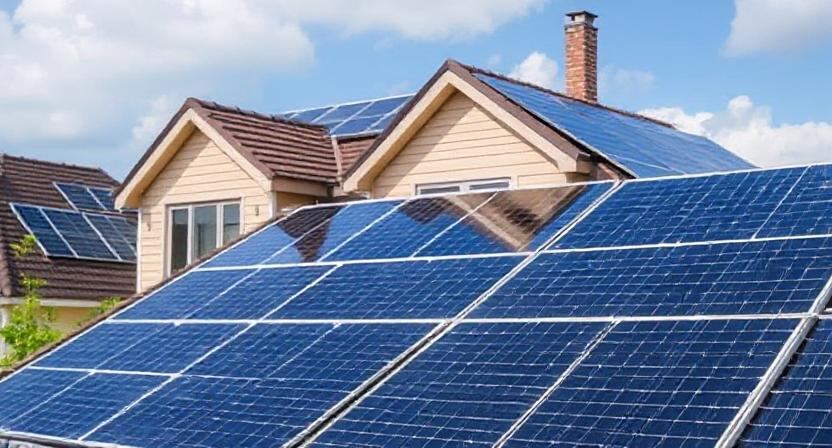By installing solar panels on your home, you can significantly reduce your monthly electricity bills and increase your property value. The financial benefits don’t stop there, as government tax credits and potential incentives can make the initial investment more manageable. But that’s just the beginning—there are other key advantages that come with embracing solar energy for your home.
Key Takeaways
- Solar panels lower monthly electricity bills significantly.
- Receive tax credits and incentives to reduce installation costs.
- Solar panels offer high ROI and long-term savings.
- Increase property value and attract buyers with eco-friendly appeal.
- Provide energy independence, reliability, and protection against rising energy costs.
Visit our website “Livingwithsolar” for getting more info about installing solar panels.
Lowered Monthly Electricity Bills

When you install solar panels, you can significantly reduce your monthly electricity bills. By harnessing the power of the sun to generate electricity for your home, you can cut down on your reliance on traditional power sources, leading to substantial savings over time.
With solar panels, you can produce your electricity, meaning you won’t need to purchase as much from your utility company.
This can result in lower monthly bills and even the possibility of earning credits for excess energy produced that’s sent back to the grid.
The initial investment in solar panels may seem daunting, but the long-term financial benefits are undeniable.
As utility rates continue to rise, your solar panels will provide a stable, predictable source of electricity at a fixed cost.
Over the years, this can amount to significant savings, allowing you to allocate your hard-earned money to other priorities.
Additionally, many governments offer incentives and rebates for installing solar panels, further enhancing the financial advantages of making the switch to solar energy.
Increased Property Value
By installing solar panels on your property, you not only lower your monthly electricity bills but also increase the overall value of your home.
Solar panels are seen as a desirable feature in today’s real estate market. Potential homebuyers are increasingly looking for energy-efficient homes that come with the added benefit of reduced utility costs.
Studies have shown that homes equipped with solar panels tend to sell faster and at a higher price than those without.
Appraisers often take solar panel installations into account when determining the value of a property, which can lead to a significant increase in your home’s overall worth.
Additionally, the long-term savings on electricity bills and the eco-friendly appeal of solar energy can be attractive selling points for your home.
Government Tax Credits
To maximize the financial benefits of installing solar panels, taking advantage of government tax credits can significantly reduce your upfront costs.
When you harness these credits, you not only save money initially but also benefit from long-term energy savings.
Here are some key points to consider:
- Federal Solar Investment Tax Credit (ITC): The ITC allows you to deduct a percentage of your solar panel system costs from your federal taxes.
- State Tax Credits: Many states offer additional tax credits on top of the federal ITC, further lowering your overall investment.
- Rebates and Incentives: Some local governments and utility companies provide rebates or incentives for installing solar panels, enhancing your savings.
- Accelerated Depreciation: For businesses that install solar panels, accelerated depreciation allows you to recover the cost of the system more quickly, leading to greater financial benefits.
Energy Independence

Achieving energy independence through solar panel installation empowers you to take control of your energy consumption and reduce reliance on traditional grid systems.
By harnessing the power of the sun, you can generate your electricity, decreasing your dependence on external energy sources.
This autonomy provides stability amidst fluctuating energy prices, ensuring a consistent energy supply for your household.
With solar panels, you can store excess energy in batteries, creating a backup power source for times when the grid may fail.
Energy independence also allows you to contribute to a more sustainable future by reducing your carbon footprint and reliance on non-renewable energy sources.
Additionally, being self-sufficient in energy production grants you peace of mind during emergencies or natural disasters when traditional power sources may be compromised.
Embracing energy independence through solar panel installation not only benefits your finances but also empowers you to live more sustainably and resiliently.
Reduced Maintenance Costs
Installing solar panels can lead to significant benefits, one of which is reduced maintenance costs.
When you invest in solar energy for your home, you can enjoy the following advantages:
- Minimal Maintenance Requirements: Solar panels have few moving parts, which means there’s less wear and tear, reducing the need for frequent maintenance.
- Long Lifespan: Solar panels are durable and can last for 25 years or more with minimal maintenance, providing long-term savings on upkeep costs.
- Warranty Coverage: Most solar panels come with warranties that cover maintenance and repairs for a certain period, reducing unexpected expenses.
- Routine Inspections: Regular check-ups by professionals ensure that your solar panels are functioning optimally, preventing costly issues in the long run.
Return on Investment (ROI)
Considering the financial aspect of installing solar panels, one key factor to evaluate is the return on investment (ROI).
The ROI for solar panels is typically high, making them a smart long-term investment for homeowners.
The initial cost of purchasing and installing solar panels can be significant, but over time, the savings on electricity bills and potential income from selling excess power back to the grid can lead to substantial returns.
The ROI of solar panels is influenced by factors such as the cost of electricity in your area, available incentives or rebates, the efficiency of the solar panels, and the amount of sunlight your location receives.
Generally, homeowners see a return on their investment within 5-7 years, depending on these variables.
After the payback period, the savings on electricity bills and potential revenue from excess energy production can continue for many years, providing a significant financial benefit.
When evaluating the ROI of solar panels, it’s essential to consider not only the upfront costs but also the long-term financial gains and environmental benefits they offer.
Solar Renewable Energy Credits (SRECs)
Solar Renewable Energy Credits (SRECs) represent an additional financial incentive for homeowners who’ve installed solar panels.
These credits are earned for every megawatt-hour of electricity your solar panels generate, which can then be sold on the market for additional income.
- SRECs can provide a steady stream of passive income for up to 15-20 years.
- The value of SRECs varies by state and market demand, but they can significantly offset the initial cost of installing solar panels.
- Selling SRECs can help you recoup a portion of your investment in solar panels faster, improving your overall return on investment.
- By participating in SREC programs, you contribute to the growth of renewable energy and help your state meet its clean energy goals.
Harnessing the power of SRECs not only benefits your wallet but also contributes to a more sustainable future for generations to come.
Protection Against Rising Energy Costs
As energy costs continue to rise unpredictably, it’s crucial to safeguard your finances against potential spikes in your utility bills.
By installing solar panels on your home, you can protect yourself from the impact of these escalating energy expenses.
Solar power allows you to generate your electricity, reducing your reliance on traditional utility providers whose rates may increase unexpectedly.
With solar energy, you can lock in a fixed electricity cost for years to come, providing you with stability and predictability in your energy expenses.
This means that as energy prices continue to soar, you can shield yourself from these surges and enjoy long-term savings on your utility bills.
Investing in solar panels now can act as a hedge against future electricity rate hikes, ensuring that you have a reliable and cost-effective source of power for your home.
Take control of your energy costs and financial security by harnessing the power of solar energy today.
Conclusion
In conclusion, installing solar panels on your home offers significant financial benefits. Lowered monthly electricity bills, increased property value, government tax credits, and energy independence all contribute to long-term savings and a reliable energy source. With a typical ROI within 5-7 years, solar panels not only save you money but also protect against rising energy costs. Make the smart choice for your wallet and the environment by going solar today.
Frequently Asked Questions
Can Solar Panels Still Generate Electricity on Cloudy Days?
Yes, solar panels can still generate electricity on cloudy days. Though the output may be reduced, they can still produce energy.
Consider the overall efficiency and output potential of your panels to account for varying weather conditions.
How Do Solar Panels Affect Homeowners Insurance Rates?
Having solar panels may increase your homeowners insurance rates slightly. Insurance companies consider them an added risk.
However, the long-term savings from reduced energy bills could offset any potential increase, making it a worthwhile investment.
Will Installing Solar Panels Require a New Roof?
You may need a new roof before installing solar panels. Ensure your roof can support the weight and is in good condition.
A sturdy roof is crucial for the successful installation and longevity of solar panels.
Do Solar Panels Increase the Risk of Roof Leaks?
No, solar panels do not increase the risk of roof leaks. Proper installation by certified professionals ensures that solar panels are securely mounted without compromising your roof’s integrity.
Enjoy the energy savings worry-free.
Are There Any Restrictions on Where Solar Panels Can Be Installed on a Property?
You can generally install solar panels on your property without restrictions. Just ensure to comply with local regulations and get necessary permits.
A professional assessment can help you determine the best location for maximum energy efficiency.

